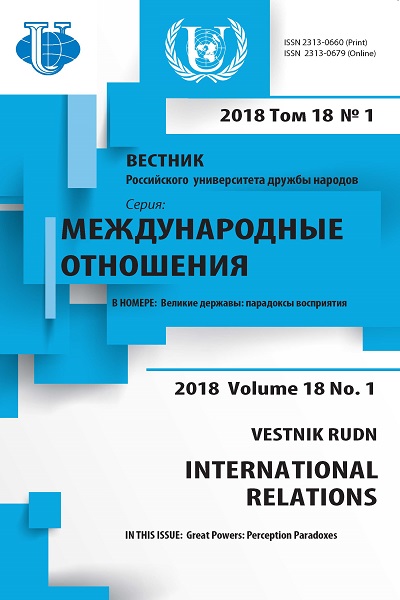The role of humanitarian cooperation in contemporary foreign policy of Spain
- Authors: Khimich G.A.1, Terentieva E.D.1
-
Affiliations:
- RUDN University (Peoples’ Friendship University of Russia)
- Issue: Vol 18, No 1 (2018): Great Powers: Perception Paradoxes
- Pages: 197-207
- Section: INTERNATIONAL EDUCATIONAL COOPERATION
- URL: https://journals.rudn.ru/international-relations/article/view/18386
- DOI: https://doi.org/10.22363/2313-0660-2018-18-1-197-207
- ID: 18386
Cite item
Full Text
Abstract
The article deals with the use of soft power in the foreign cultural policy of Spain in the following areas: the dissemination of language and culture and international cooperation in the field of education. The authors studied the factors that influenced the formation of the strategy of the cultural and educational cooperation in foreign policy of Spain, and main institutions for its implementation. In the era of globalization, culture and education are increasingly moving beyond national boundaries and transform into an instrument of interethnic dialogue and modern geopolitics. Cultural cooperation policy presents a powerful resource for foreign policy activity of a country with a large number of UNESCO World Heritage sites, the richest history and culture, but also of a country that develops constantly and dynamically, and it uses skillfully its competitive advantages. The activities aimed at expanding the educational model of Spain in other countries can be relatively divided into three components: cooperation in the field of higher education with universities in other countries, the spread of the language and culture of Spain abroad in the educational centers and institutions of culture, and teaching Spanish language for foreign citizens inside the country. In the first section, we consider the ways of attracting students to Spain through a number of programs taking into consideration Bologna educational system which Spain has joined. Second section is devoted to the analysis of diplomatic, informational and other types of assistance in the sphere of expansion of the Spanish language and culture, realized by Spanish state authorities in the Russian Federation. In the third subsection, we adduce the data about changes in policy of teaching foreign students on the territory of Spain. To form high quality and approachable teaching system, multiple steps were done both in the universities and private linguistic centers with high level of teaching guaranteed by Cervantes Institute. This study is aimed at all those who are interested in the issues of cultural and educational cooperation, foreign policy of Spain and relations between our countries.
About the authors
Galina Aleksandrovna Khimich
RUDN University (Peoples’ Friendship University of Russia)
Author for correspondence.
Email: khimich_ga@rudn.university
PhD in Philology, Associate Professor, Head of the Section of the Spanish Language, Associate Professor of the Department of Foreign Languages, Faculty of Humanities and Social Sciences of RUDN University
Ekaterina Dmitrievna Terentieva
RUDN University (Peoples’ Friendship University of Russia)
Email: terentyeva_ed@rudn.university
PhD in Philology, Associate Professor of the Department of Foreign Languages, Faculty of Humanities and Social Sciences of RUDN University
References
- Bogolyubova, N. M. & Nikolaeva, Y. V. (2008). Foreign Cultural Centers as an Independent Actor of Foreign Cultural Policy. Vestnik Sankt-Peterburgskogo Universiteta, 2, 87—93. (In Russ.).
- Borzova, A. Yu. (2014). Foreign policy of Spain. Textbook. Moscow: RUDN. (In Russ.).
- Castro, José Luján. (2001). La enseñanza del español como lengua extranjera en Europa: cifras de la situación actual y manifestaciones de los estudiantes. II Congreso Internacional de la Lengua Española «El español en la sociedad de la información». Valladolid. URL: http://congresosdelalengua.es/valladolid/ponencias/activo_del_espanol/1_la_industria_del_ espanol/lujan_j.htm (accessed: 25.09.2017).
- Instituto Cervantes. Informe anual 2017. URL: https://cvc.cervantes.es/lengua/espanol_lengua_ viva/pdf/espanol_lengua_viva_2017.pdf (accessed: 25.09.2017).
- Joseph, S. & Nye, Jr. (2003). La paradoja del poder norteamericano. Madrid: Taurus.
- Kosyak, E. V. (2015). Foreign policy of Spain in the 21st century: conceptual framework. Мoscow: Aspect-Press. (In Russ.).
- Lyarskaya, V. S. & Khimich, G. A. (2015). La diplomacia pública Web 2:0 en España. Yazyki i kultury: perspektivy razvitiya v 21 veke, Materialy kruglogo stola RUDN, 197—202.
- Nye, J. (2004). Soft Power, The Means to Success in World Politics. New York: Public Affairs.
- Ruis-Ulldemolins, J. & Rubio Arostegui, A. (2015). “Presentación”. Política y Sociedad, 52 (1), 9—26.
- Saul, J. (2005). The Collapse of Globalism and the Rebirth of Nationalism. Toronto: Penguin Books Canada.
- Shelepov, A.V. (2014). The success factors of the British soft power policy. International Organisations Research Journal, 9(2), 10—28. (In Russ.).
- Sizonenko, A. I. (2007). The Cultural Element — The Important Component of the Spanish Foreign Cultural Policy. Latinskaya Amerika, 11, 32—34. (In Russ.).
- Terentieva, E. D. (2013). The Role of the Cervantes Institute In Spreading of the Learning of the Spanish Language in the World. Yazyki i kultury: effektivnaya kommunikatsiya v usloviyakh globalizatsii. Materialy mezhvuzovskoy nauchno-prakticheskoy konferentsii “Obuchenie inostrannym yazykam v kontekste dialoga kultur”, Moscow, 116—119. (In Russ.).
- Torkunov, А. V. (2012). Education as an Instrument of Soft Power in Foreign Policy of Russia. Vestnik MGIMO Universiteta, 25(4), 85—93. (In Russ.).
Supplementary files










